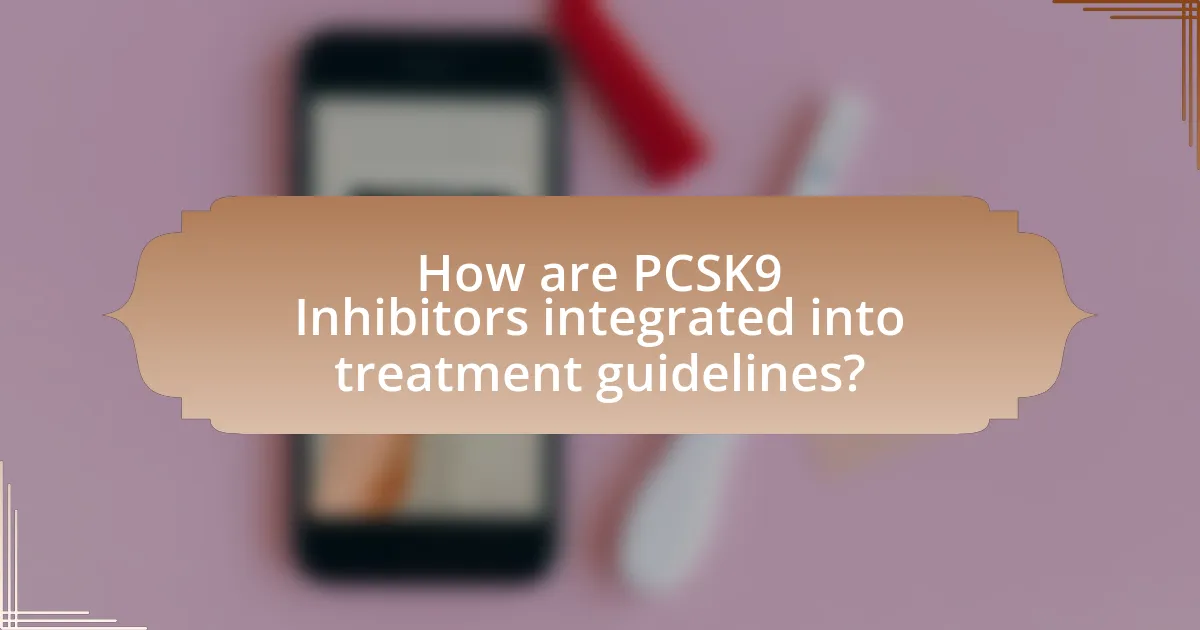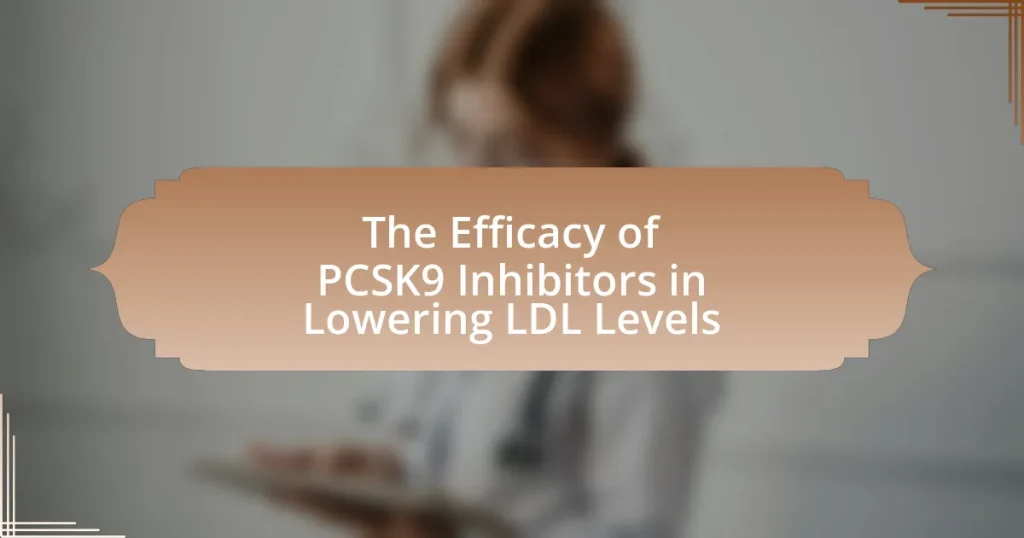PCSK9 inhibitors are a class of medications designed to lower low-density lipoprotein (LDL) cholesterol levels by inhibiting the PCSK9 protein, which enhances the liver’s ability to clear LDL cholesterol from the bloodstream. These inhibitors have shown significant efficacy in clinical trials, reducing LDL levels by 50% to 70%, particularly benefiting patients with hyperlipidemia or those intolerant to statins. The article explores the mechanism of action, clinical implications, benefits, risks, and cost considerations associated with PCSK9 inhibitors, as well as their integration into treatment guidelines and future developments in therapy. Evidence from major clinical trials supports their role in reducing cardiovascular events, making them a critical option in managing high cholesterol levels.

What are PCSK9 Inhibitors and their role in lowering LDL levels?
PCSK9 inhibitors are a class of medications that lower low-density lipoprotein (LDL) cholesterol levels by inhibiting the protein PCSK9, which leads to increased LDL receptor availability on liver cells. By blocking PCSK9, these inhibitors enhance the liver’s ability to remove LDL cholesterol from the bloodstream, resulting in significant reductions in LDL levels. Clinical studies have demonstrated that PCSK9 inhibitors can reduce LDL cholesterol by 50% to 70% when used in conjunction with statins or as monotherapy, making them effective for patients with hyperlipidemia or those who are statin-intolerant.
How do PCSK9 Inhibitors function in the body?
PCSK9 inhibitors function by blocking the protein PCSK9, which normally promotes the degradation of LDL receptors in the liver. By inhibiting this protein, these medications increase the number of LDL receptors available to clear low-density lipoprotein (LDL) cholesterol from the bloodstream, thereby lowering LDL cholesterol levels. Clinical studies have demonstrated that PCSK9 inhibitors can reduce LDL cholesterol by 50% or more, significantly impacting cardiovascular risk.
What is the mechanism of action of PCSK9 Inhibitors?
PCSK9 inhibitors work by blocking the protein PCSK9, which leads to increased availability of LDL receptors on liver cells. This increase in LDL receptors enhances the liver’s ability to clear low-density lipoprotein (LDL) cholesterol from the bloodstream, thereby lowering LDL cholesterol levels. Clinical studies have demonstrated that PCSK9 inhibitors can reduce LDL cholesterol by 50-60% when used in conjunction with statins or as monotherapy, confirming their efficacy in managing hyperlipidemia.
How do PCSK9 Inhibitors affect LDL receptor activity?
PCSK9 inhibitors increase LDL receptor activity by preventing the degradation of LDL receptors in the liver. Normally, PCSK9 binds to LDL receptors and promotes their degradation, leading to reduced uptake of LDL cholesterol from the bloodstream. By inhibiting PCSK9, these drugs enhance the recycling and availability of LDL receptors on liver cells, which facilitates greater clearance of LDL cholesterol from the circulation. Clinical studies have shown that PCSK9 inhibitors can significantly lower LDL cholesterol levels, confirming their role in enhancing LDL receptor activity and improving lipid profiles in patients with hyperlipidemia.
What are the clinical implications of using PCSK9 Inhibitors?
PCSK9 inhibitors significantly reduce low-density lipoprotein (LDL) cholesterol levels, leading to improved cardiovascular outcomes. Clinical implications include a marked decrease in the risk of heart attacks and strokes, as evidenced by studies such as the FOURIER trial, which demonstrated a 15% reduction in cardiovascular events among patients treated with evolocumab. Additionally, these inhibitors are particularly beneficial for patients with familial hypercholesterolemia or those who are statin-intolerant, providing an alternative therapeutic option. The use of PCSK9 inhibitors also necessitates consideration of cost-effectiveness and long-term safety, as ongoing research continues to evaluate their role in broader patient populations.
What evidence supports the efficacy of PCSK9 Inhibitors in clinical trials?
PCSK9 inhibitors have demonstrated significant efficacy in clinical trials for lowering LDL cholesterol levels. For instance, the FOURIER trial, which involved over 27,000 patients, showed that the use of evolocumab reduced LDL levels by approximately 59% compared to placebo, leading to a 15% reduction in cardiovascular events. Similarly, the ODYSSEY OUTCOMES trial reported that alirocumab resulted in a 62% reduction in LDL levels and a 15% decrease in major adverse cardiovascular events among high-risk patients. These trials provide robust evidence supporting the effectiveness of PCSK9 inhibitors in managing LDL cholesterol and improving cardiovascular outcomes.
How do PCSK9 Inhibitors compare to traditional LDL-lowering therapies?
PCSK9 inhibitors are more effective than traditional LDL-lowering therapies in significantly reducing LDL cholesterol levels. Clinical trials have demonstrated that PCSK9 inhibitors can lower LDL cholesterol by 50-70% when used in conjunction with statins, whereas traditional therapies like statins typically achieve a reduction of 30-50%. For instance, the FOURIER trial showed that the PCSK9 inhibitor evolocumab reduced LDL cholesterol levels by an average of 59% compared to placebo, highlighting its superior efficacy over standard treatments.

What are the benefits and risks associated with PCSK9 Inhibitors?
PCSK9 inhibitors provide significant benefits in lowering LDL cholesterol levels and reducing cardiovascular events, while also presenting certain risks. These medications can lower LDL cholesterol by approximately 50-60% when used alongside statins, which is supported by clinical trials such as the FOURIER study, demonstrating a 15% reduction in cardiovascular events among patients treated with evolocumab. However, risks include potential side effects such as injection site reactions, allergic reactions, and the possibility of neurocognitive effects, which have been reported but require further investigation for conclusive evidence.
What are the primary benefits of PCSK9 Inhibitors for patients?
PCSK9 inhibitors primarily benefit patients by significantly lowering low-density lipoprotein (LDL) cholesterol levels. Clinical studies have demonstrated that these medications can reduce LDL cholesterol by 50% to 70% when used in conjunction with statins or as monotherapy. For instance, the FOURIER trial showed that patients treated with evolocumab experienced a 59% reduction in LDL cholesterol compared to placebo, leading to a substantial decrease in cardiovascular events. Additionally, PCSK9 inhibitors are particularly beneficial for individuals with familial hypercholesterolemia or those who are statin-intolerant, providing an effective alternative for managing high cholesterol levels.
How do PCSK9 Inhibitors contribute to cardiovascular risk reduction?
PCSK9 inhibitors contribute to cardiovascular risk reduction primarily by significantly lowering low-density lipoprotein (LDL) cholesterol levels. These medications work by inhibiting the PCSK9 protein, which normally promotes the degradation of LDL receptors in the liver. By preventing this degradation, PCSK9 inhibitors increase the number of LDL receptors available to clear LDL cholesterol from the bloodstream. Clinical studies, such as the FOURIER trial, have demonstrated that patients treated with PCSK9 inhibitors experienced a reduction in cardiovascular events, including heart attacks and strokes, correlating with the substantial decrease in LDL cholesterol levels. This evidence supports the role of PCSK9 inhibitors in mitigating cardiovascular risk through effective LDL cholesterol management.
What are the potential side effects of PCSK9 Inhibitors?
PCSK9 inhibitors can cause side effects such as injection site reactions, flu-like symptoms, and muscle pain. Clinical trials have reported these adverse effects, with injection site reactions occurring in approximately 10% of patients, while flu-like symptoms and muscle pain are less common but still significant. Additionally, some patients may experience allergic reactions, including rash or itching. These side effects highlight the importance of monitoring patients during treatment with PCSK9 inhibitors.
Why might patients be hesitant to use PCSK9 Inhibitors?
Patients may be hesitant to use PCSK9 inhibitors due to concerns about cost, potential side effects, and lack of familiarity with the treatment. The high price of PCSK9 inhibitors, often exceeding $14,000 annually, can deter patients, especially those without adequate insurance coverage. Additionally, some patients worry about possible adverse effects, such as injection site reactions or allergic responses, despite clinical trials indicating a favorable safety profile. Furthermore, limited awareness and understanding of PCSK9 inhibitors among patients and healthcare providers can lead to reluctance in adopting this newer class of cholesterol-lowering medications.
What are the cost considerations for patients using PCSK9 Inhibitors?
PCSK9 inhibitors are associated with high costs, often exceeding $14,000 annually per patient. This significant financial burden arises from the price of the medications, which can vary based on insurance coverage and patient assistance programs. Many patients may face high out-of-pocket expenses, especially if their insurance does not cover these drugs or if they have high deductibles. Additionally, the cost-effectiveness of PCSK9 inhibitors is debated, with studies indicating that while they effectively lower LDL cholesterol, their high price may limit their accessibility for many patients.
How do patients perceive the long-term use of PCSK9 Inhibitors?
Patients generally perceive the long-term use of PCSK9 inhibitors positively, primarily due to their effectiveness in significantly lowering LDL cholesterol levels. Studies indicate that patients report improved health outcomes and reduced cardiovascular risks associated with sustained LDL reduction. For instance, a clinical trial published in the Journal of the American College of Cardiology found that patients using PCSK9 inhibitors experienced a 50-60% reduction in LDL levels over extended periods, leading to enhanced adherence and satisfaction with their treatment regimen. Additionally, qualitative research highlights that patients appreciate the convenience of injectable formulations and the potential for long-term cardiovascular protection, reinforcing their favorable perception of these medications.

How are PCSK9 Inhibitors integrated into treatment guidelines?
PCSK9 inhibitors are integrated into treatment guidelines primarily for patients with hyperlipidemia who are at high risk for cardiovascular events. These guidelines recommend the use of PCSK9 inhibitors, such as alirocumab and evolocumab, in conjunction with statins or as an alternative for patients who are statin-intolerant or have not achieved adequate LDL cholesterol reduction with statins alone. Evidence from clinical trials, such as the FOURIER trial, demonstrated that PCSK9 inhibitors significantly lower LDL cholesterol levels by approximately 50-60% and reduce cardiovascular events, supporting their inclusion in guidelines from organizations like the American College of Cardiology and the European Society of Cardiology.
What do current guidelines recommend regarding the use of PCSK9 Inhibitors?
Current guidelines recommend the use of PCSK9 inhibitors for patients with atherosclerotic cardiovascular disease (ASCVD) or familial hypercholesterolemia who require additional LDL cholesterol lowering despite maximally tolerated statin therapy. These recommendations are supported by clinical trial data demonstrating that PCSK9 inhibitors can reduce LDL cholesterol levels by approximately 50-60% when added to statin therapy. The American College of Cardiology and the American Heart Association guidelines emphasize their role in high-risk patients to further decrease cardiovascular events.
How do healthcare providers determine eligibility for PCSK9 Inhibitor therapy?
Healthcare providers determine eligibility for PCSK9 Inhibitor therapy primarily based on a patient’s LDL cholesterol levels, cardiovascular risk factors, and previous treatment responses. Specifically, patients with familial hypercholesterolemia or those who have atherosclerotic cardiovascular disease and have not achieved adequate LDL reduction with statins or other therapies are considered eligible. Clinical guidelines, such as those from the American College of Cardiology and the American Heart Association, recommend evaluating these criteria to ensure that patients are appropriate candidates for this therapy, which has been shown to significantly lower LDL levels by up to 60% in eligible populations.
What role do PCSK9 Inhibitors play in personalized medicine for hyperlipidemia?
PCSK9 inhibitors play a crucial role in personalized medicine for hyperlipidemia by providing targeted lipid-lowering therapy tailored to individual patient profiles. These monoclonal antibodies, such as alirocumab and evolocumab, specifically inhibit the PCSK9 protein, leading to increased LDL receptor availability and enhanced clearance of LDL cholesterol from the bloodstream. Clinical studies have demonstrated that PCSK9 inhibitors can significantly reduce LDL cholesterol levels by 50-60% in patients who are statin-intolerant or have familial hypercholesterolemia, thus allowing for personalized treatment strategies based on genetic and phenotypic characteristics. This targeted approach not only improves lipid profiles but also reduces cardiovascular risk, aligning with the principles of personalized medicine.
What future developments can we expect in PCSK9 Inhibitor therapy?
Future developments in PCSK9 inhibitor therapy include the introduction of more affordable biosimilars and advancements in combination therapies. These developments aim to enhance patient access and improve treatment outcomes. For instance, ongoing clinical trials are exploring the efficacy of combining PCSK9 inhibitors with other lipid-lowering agents, which may lead to synergistic effects in lowering LDL cholesterol levels. Additionally, the potential for oral formulations is being investigated, which could increase patient adherence compared to current injectable options. These advancements are supported by research indicating that improved accessibility and combination strategies can significantly impact cardiovascular risk management.
How might new research impact the use of PCSK9 Inhibitors?
New research may enhance the use of PCSK9 inhibitors by providing evidence of their long-term efficacy and safety in diverse populations. For instance, studies like the FOURIER trial demonstrated that PCSK9 inhibitors significantly reduce LDL cholesterol levels and cardiovascular events, suggesting their potential as a standard treatment for high-risk patients. Additionally, emerging data on the genetic mechanisms of PCSK9 may lead to personalized treatment approaches, optimizing patient outcomes and expanding the indications for these therapies.
What advancements are being made in the formulation of PCSK9 Inhibitors?
Recent advancements in the formulation of PCSK9 inhibitors include the development of more potent and longer-acting agents, such as inclisiran, which utilizes RNA interference technology to reduce LDL cholesterol levels effectively. Clinical trials have demonstrated that inclisiran can lower LDL cholesterol by approximately 50% with biannual dosing, showcasing its efficacy and convenience compared to traditional monoclonal antibodies that require more frequent administration. Additionally, ongoing research is focusing on oral formulations and combination therapies to enhance patient adherence and broaden the therapeutic options available for managing hyperlipidemia.
What practical tips should patients consider when using PCSK9 Inhibitors?
Patients using PCSK9 inhibitors should adhere to their prescribed dosing schedule to maximize efficacy in lowering LDL cholesterol levels. Consistent administration, typically via subcutaneous injection every two to four weeks, ensures optimal therapeutic outcomes. Additionally, patients should monitor their lipid levels regularly, as recommended by their healthcare provider, to assess the effectiveness of the treatment. Engaging in discussions with healthcare professionals about any side effects or concerns can lead to better management of the therapy. Studies indicate that adherence to treatment regimens significantly correlates with improved lipid profiles, reinforcing the importance of these practical tips.










